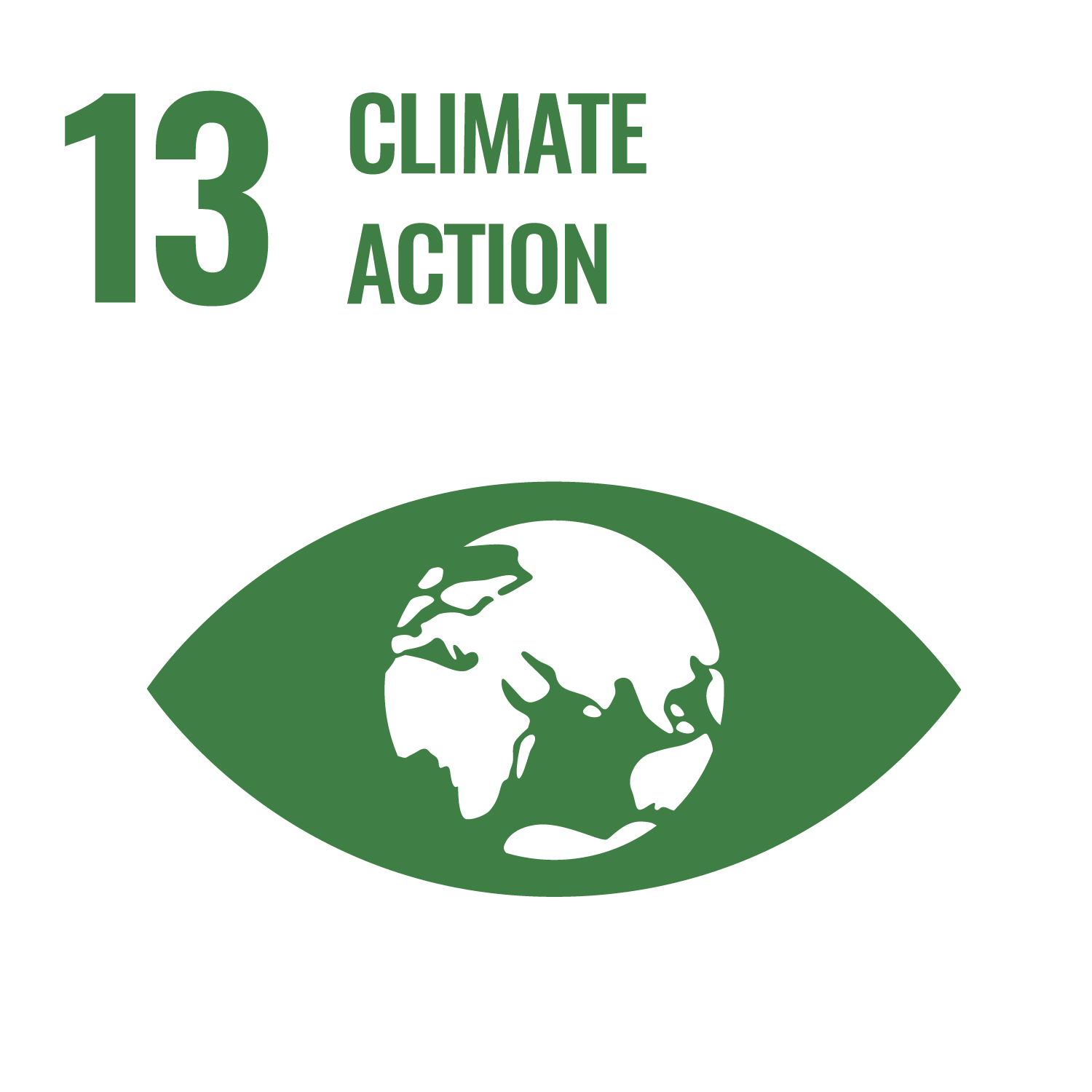 Goal 13. Climate Action
Goal 13. Climate Action
13.3.1 Local education programmes on climate
2023-2024
Education and awareness raising are powerful means with which to address climate change, global warming and the emission of greenhouse gases. Community-based climate risk, impact, adaptation, mitigation, and early warning programmes enhance climate literacy and help to reduce vulnerability, while empowering communities and students to participate in efforts to reduce emissions. It is the vision of the AASTMT to mainstream such programs within its institutional climate action.
Go Green Campaign at the College of Pharmacy – AASTMT, Alamein Campus:
The Go Green Campaign at the College of Pharmacy – AASTMT, Alamein Campus, reflects the institution’s commitment to social responsibility and empowerment of students in addressing pressing environmental challenges. By reducing single-use plastics, the campaign contributes to protecting natural resources, improving community health, and promoting environmental safety. Such initiatives also raise awareness among young people about their role in combating inequalities and building resilience in the face of ecological vulnerabilities. Through awareness sessions and active participation, students gain practical skills that prepare them to lead sustainable change, especially in developing countries where the impact of disasters and pollution on disadvantaged communities is most severe.

Conference on Climate Change and Environmental Sustainability
conference on climate change and environmental sustainability held on 05 July 2023 at Arab Academy for Science, Technology & Maritime Transport (AASTMT). The event addresses both sides—sustainable practices (mitigation) and environmental change (adaptation). By engaging students and faculty in climate-change discussions, it builds institutional and human capacity. It helps embed climate focus into curriculum and institutional planning, aligning with national and global frameworks. Elevates the knowledge base of future professionals and decision-makers, which is crucial for climate action.
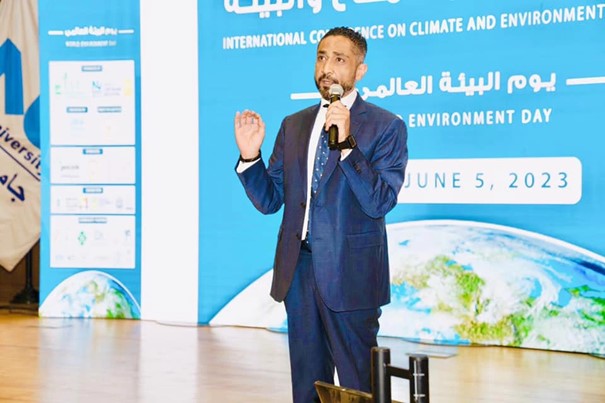
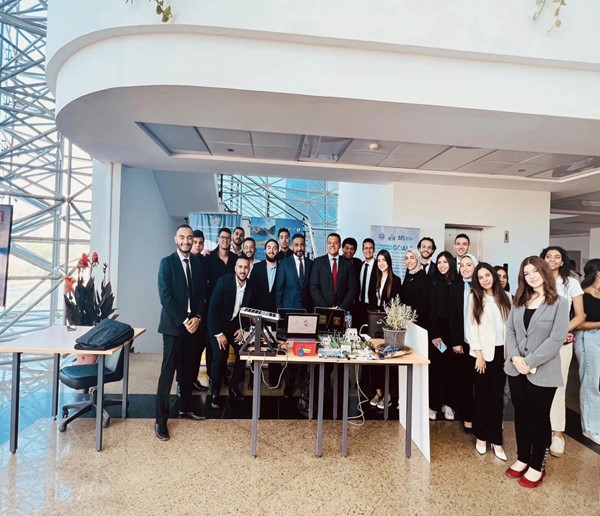
Corporate Sustainability and ESG Reporting:
The training event titled “Corporate Sustainability and ESG Reporting,” held at the College of Fisheries and Aquaculture Technology (CFAT) in July 2024, strongly supports SDG Indicator 13.3.1, which focuses on enhancing education, training, and institutional capacity on climate action. The session, delivered under the National Initiative for Smart Green Projects, equipped students with essential knowledge on sustainability practices, ESG reporting, and the role of environmental responsibility in business and community engagement. By building students’ climate-related skills and raising awareness of sustainability principles, the event directly contributes to strengthening human and institutional capacity for climate-action mitigation and adaptation

MOU by AASTMT:
The AASTMT Maritime Postgraduate Studies Institute signed an MOU with the Arab Institute of Navigation to offer no cost training courses in marine safety, first aid, and firefighting onboard ships as a means of fulfilling its social responsibility. This action contributes to climate adaptation and reduction of its effects by increasing the readiness and safety consciousness of USV operators in climate-related threats such as marine heatwaves, and emergencies at sea. The programme contributes to the target 13.3.1through practical localized trainings that enhance early warning systems and resiliency in the maritime industry.
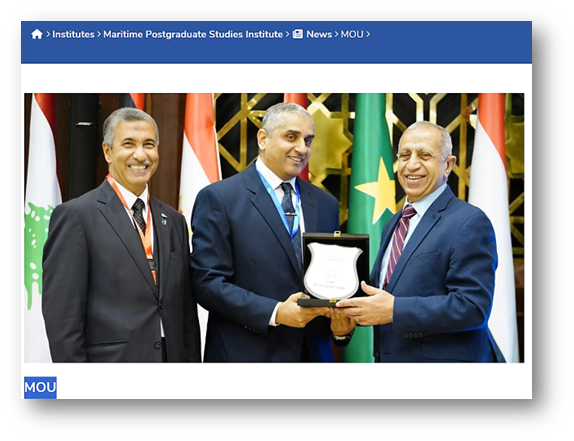
Climate Change and Remote Sensing Applications for College Students 15 Aug, 2024:
Training courses on climate change and remote sensing organized by the College of Fisheries & Aquaculture Technology, AASTMT this 3-day. This is directly a local education programme on climate risks, impacts, and adaptation. It includes Theoretical and practical lectures in remote sensing and climate change; fisheries & aquaculture applications; a field/research vessel visit. This training helps students understanding the climate risks and monitoring.
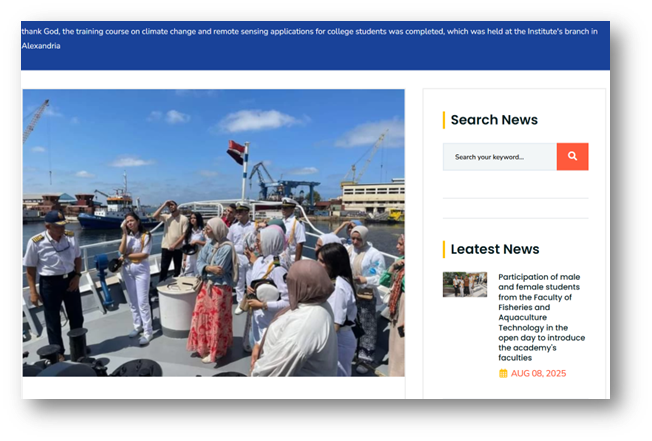
Impacts of Climate Change on Achieving Sustainable Development Goals” session:
AASTMT took part in a session through the Vision 2030 Forum, lecturing on origins and signs of climate change, the implication of greenhouse gas emissions, and measures for mitigation and as early warning. The programme highlighted the connection between reducing carbon footprint and climate mitigation policy and adaptation, raising awareness and backing Egypt’s path to a low-emission climate resilient future.
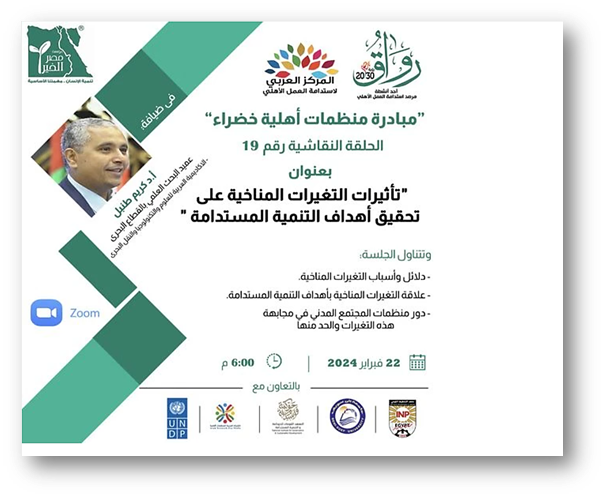
Arab Day for Disaster Risk Reduction 2024:
The Arab Day for Disaster Risk Reduction 2024, held on 28 March 2024, the workshop organized under this celebration addressed disaster risk management, crisis response, climate-related threats, and resilience building — all core aspects of climate adaptation and early warning systems. The discussions and capacity-building sessions enhanced participant awareness of climate-induced disasters and promoted preparedness strategies.
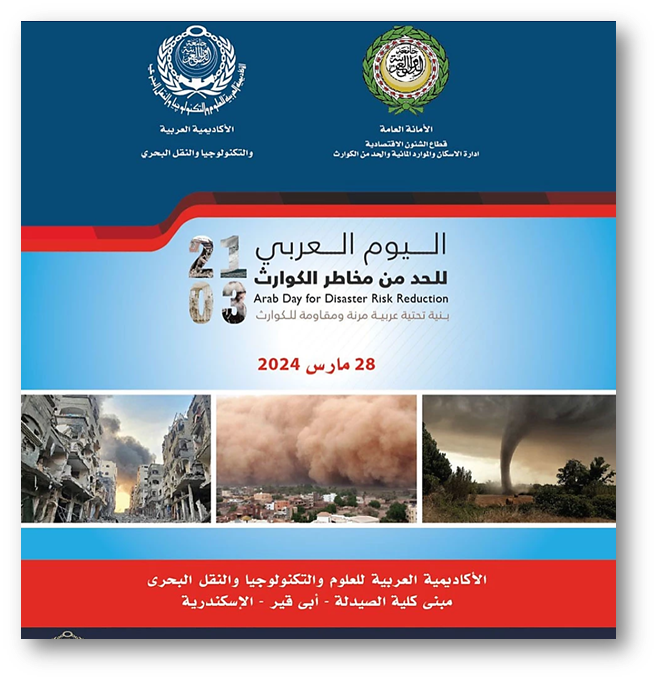
AASTMT at COP29 in Baku, Azerbaijan November 2024: Key Forum on Education, Climate Change & Human Capacity Building:
AASTMT in collaboration with the League of Arab States, organized an international forum during COP29 focusing on the intersection of education, climate change, and sustainability. The event addressed the urgent global challenges of CO₂ emissions, global warming, and greenhouse gas mitigation, emphasizing the role of educational institutions in carbon reduction, climate adaptation, and environmental impact mitigation. Experts highlighted how research, innovation, and policy integration can enhance climate resilience, carbon footprint reduction.
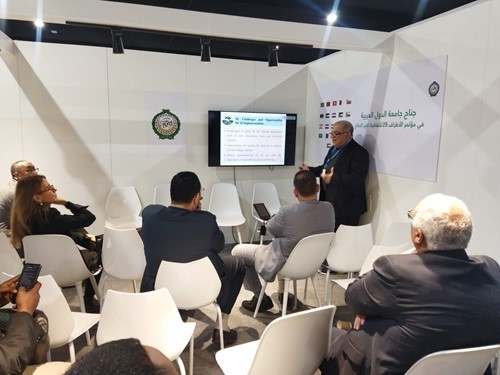
Climate Change and Water Management (UNR1601) Training:
AASTMT organized an educational program titled “Climate Change and Water Management (UNR1601)” that focused on understanding the effects of climate change on water resources and sustainable development. The course aimed to enhance students’ awareness of climate-related challenges and adaptation strategies, with more than 200 participants engaged in the program.
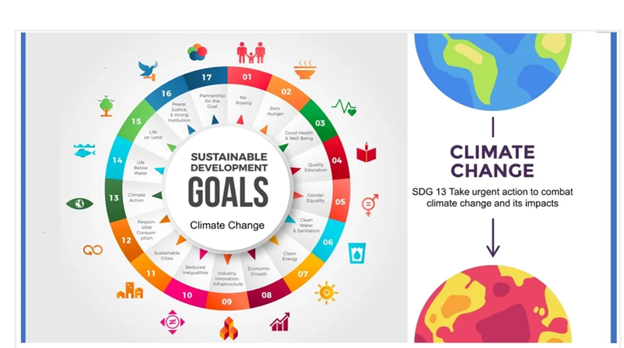
Green Peace and Sustainable Resilience Forum:
The forum is an educational and awareness event where students participated in discussions about climate policy, green peace, sustainable resilience, and the role of media — all components of climate change education and public awareness. students participated in sessions and discussions about climate policy, sustainable resilience, and green peace, which directly aim to raise awareness and build understanding of climate change risks, impacts, mitigation, and adaptation

SPEED Strategies for CaPacity building of hybrid Electric vehicle in Engineering Division:
The SPEED project aims to build capacity in Hybrid Electric Vehicle (HEV) technologies through the development of new curricula, training programs, and the establishment of International Centers of Hybrid Electric Vehicle Technologies (HEV-T) in the Mediterranean region. Through postgraduate and undergraduate training, SPEED promotes energy efficiency, renewable energy integration, and GHG reduction, directly contributing to climate change mitigation and sustainable mobility.
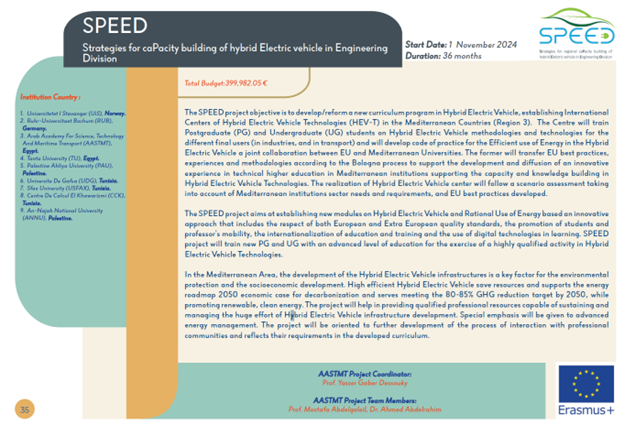
GREEN Developing a curriculum on Green Hydrogen Technologies and Applications in Southern Mediterranean Countries:
The GREEN project aims to develop a curriculum on Green Hydrogen Technologies and Applications in Southern Mediterranean Countries through collaboration between higher education institutions and industry partners. Green hydrogen, produced from renewable energy sources, plays a critical role in reducing greenhouse gas emissions, supporting clean mobility, and advancing climate-neutral energy systems.
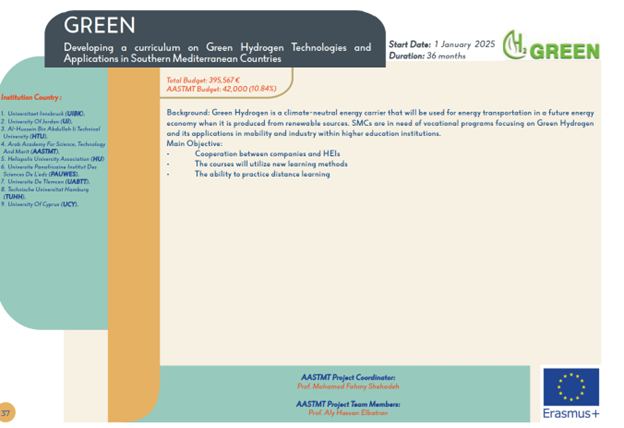
AASTMT Education Curriculum for Climate Action and Early Warning systems (2024):
In 2024, AASTMT strengthened its commitment to SDG 13.3.1 through a range of educational programs and initiatives. The Meteorology Courses offered across AASTMT’s maritime and fisheries colleges provide students with essential understanding of weather systems, climate variability, and extreme event forecasting key competencies for early warning preparedness. The MSc in Smart Environmental Management of Climate Change (SECCM) focuses on scientific and technological strategies for CO₂ reduction, climate risk monitoring, and adaptation planning, empowering graduates to implement effective climate action policies.

AASTMT Education Curriculum for Climate Action
Unigreen projects Workshops:
The Arab Academy for Science, Technology and Maritime Transport (AASTMT), in collaboration with the European Union, launched the UniGreen National Competition to encourage university students to develop innovative projects addressing climate change, carbon footprint reduction, and environmental sustainability. The initiative aims to build youth capacity in climate action, green innovation, and sustainable resource management, supporting Egypt’s Vision 2030 and the UN Sustainable Development Goals (SDG 13 – Climate Action).
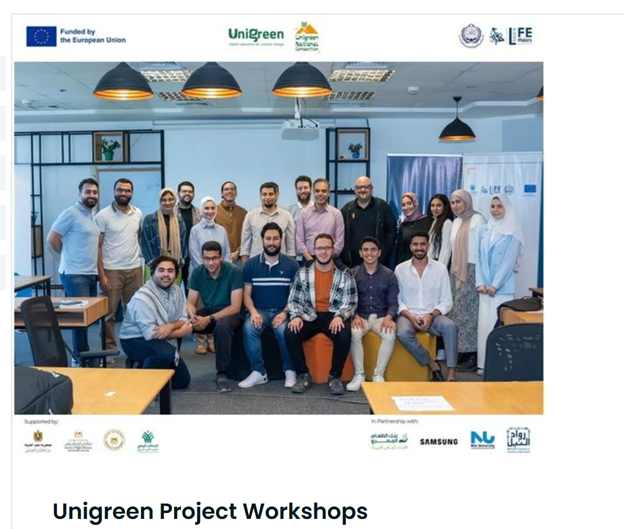
AASTMT Hosts Forum on Strategic Ocean Alliance to Tackle Climate Impacts on Marine Ecosystem:
On December 9, 2023, AASTMT organized a forum titled “Strategic Ocean Alliance” at the League of Arab States pavilion, as part of Environment & Meteorology Day. The event brought together regional and international experts, civil society and private sector stakeholders to discuss climate adaptation and mitigation strategies for marine ecosystems. Topics included CO₂ emissions reduction, marine biodiversity protection, and advancing sustainable economic practices in maritime regions.
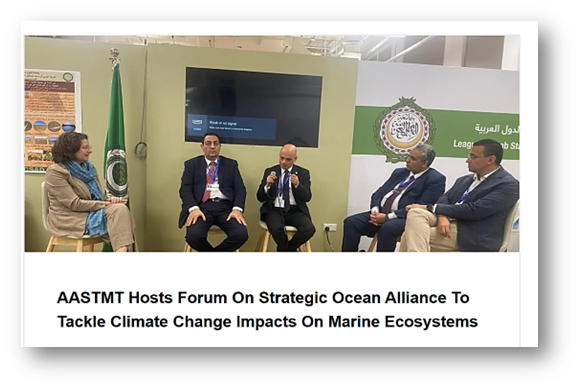
2022-2023
AASTMT actively provides local education programs and campaigns on climate change, addressing risks, impacts, mitigation, adaptation, and early warning strategies. Through integrated academic curricula, hands-on workshops, and community outreach initiatives, AASTMT equips students and local communities with the knowledge and skills to combat climate change. Programs include the integration of climate resilience into 90% of academic offerings, specialized courses like Meteorology, and events such as the "Climate Change Resilience" workshop. These efforts foster understanding of CO2 emissions reduction, greenhouse gas mitigation, and climate adaptation, aligning with global climate goals and supporting sustainable development.
AASTMT Launches Climate Action Plan to Promote Resilience, Climate Education, and Community Engagement
AASTMT’s Climate Action Plan establishes comprehensive local education programs on climate change, addressing risks, impacts, mitigation, adaptation, and early warning strategies. The plan integrates sustainability education into 90% of academic programs by 2025, with a specialized focus on climate resilience, sustainable development, and CO2 emissions reduction. Through targeted coursework and community engagement, including a master’s program in Smart Environmental Management of Climate Change, AASTMT fosters climate literacy and equips participants to address global warming and greenhouse gas emissions.

Access the Climate Action Plan for more details
Master of Science Degree in Smart Environmental Management of Climate Change (SECCM):
AASTMT’s Master of Science in Smart Environmental Management of Climate Change (SECCM) provides advanced education on climate change risks, impacts, mitigation, adaptation, and early warning systems. The program equips students with critical skills to address global warming, greenhouse gas emissions, and sustainable environmental management. Through specialized coursework and research, SECCM supports CO2 reduction and climate resilience, fostering expertise in climate adaptation strategies tailored to the maritime and environmental sectors.
Learn more about the SECCM program here.
Meteorology Course:
Meteorology courses at AASTMT are offered across three institutes: the College of Maritime Transport and Technology, the College of Fisheries and Aquaculture Technology, and the Institute of Maritime Upgrading Studies. These programs provide local education on climate risks, impacts, and early warning systems, focusing on weather patterns and their influence on maritime and aquatic operations. Students are equipped with skills to analyze climate change effects, greenhouse gas emissions, and CO2 mitigation strategies using advanced meteorological tools. By addressing climate adaptation and risk reduction, these courses contribute to climate literacy and sustainable development goals.
Learn more about AASTMT Meteorology Courses here.
Learn more about AASTMT Meteorology Courses here.
Learn more about AASTMT Meteorology Courses here.
Climate Change Resilience Event: Promoting Climate Literacy and Adaptation
The Climate Change Resilience Event, hosted by AASTMT’s College of Engineering and Technology, provides a local education program focused on climate risks, mitigation, adaptation, and greenhouse gas reduction. Organized by the IEEE-Eta Kappa Nu (HKN) Mu Beta Chapter, the event featured expert talks on sustainable technologies, renewable energy, and CO2 emissions monitoring. Participants explored global efforts to combat climate change, including COP27 outcomes, and received hands-on training in sustainable engineering practices. This initiative fosters climate literacy and equips attendees with the skills to address climate impacts and promote resilience.

Learn more about the Climate Change Resilience Event here.
AASTMT Youth Forum 2022 Educates Youth on Climate Risks and Sustainable Innovation
The AASTMT Youth Forum 2022 provided a local education platform to address climate risks, impacts, and sustainable solutions. Through interactive workshops on topics like climate migration, CO2 emissions reduction, and sustainable innovation, the forum empowered young participants with the skills to mitigate climate impacts and promote adaptation strategies. By fostering climate literacy and raising awareness of global warming and greenhouse gas emissions, the forum aligns with AASTMT’s commitment to advancing climate education and supporting sustainable development goals.


Learn more about the AASTMT Youth Forum 2022 here.
Towards a Green and Sustainable Future” Initiative Promotes Climate Education and Awareness at AASTMT:
The “Towards a Green and Sustainable Future” initiative at AASTMT provides a local education program that addresses climate change risks, impacts, and mitigation strategies. Organized by the College of Engineering and Technology, the event offered hands-on learning experiences to local students through interactive tours of solar power plants, renewable energy labs, and aquaculture facilities. Participants gained practical knowledge on CO2 reduction, greenhouse gas mitigation, and sustainable practices, fostering climate literacy and adaptation skills. This initiative highlights AASTMT’s commitment to raising climate awareness and building capacity for a sustainable future.

Learn more about the “Towards a Green and Sustainable Future” initiative here.
AASTMT Postgraduate Research Drives Climate Education and Innovative Solutions for Climate Resilience
AASTMT’s postgraduate research programs actively support local education on climate change risks, impacts, and mitigation strategies. Research initiatives focus on topics such as CO2 emissions reduction, climate adaptation in agriculture, eco-friendly waste management, and resilience to global warming. These projects equip students with the knowledge and skills to address greenhouse gas emissions and develop innovative solutions for sustainable development. By fostering climate literacy and practical expertise, AASTMT contributes to building capacity for climate resilience and sustainable practices.

Learn more about AASTMT’s postgraduate research initiatives here.
AASTMT and Egyptian Universities Join Forces to Empower Youth in Climate Change Mitigation
AASTMT collaborated with Egyptian universities to launch a workshop aimed at empowering youth through local education programs on climate change mitigation. The initiative addressed climate risks, impacts, CO2 reduction strategies, and adaptation practices, fostering climate literacy among students and faculty. Discussions included outcomes from COP27 and innovative solutions for reducing greenhouse gas emissions. This event highlights AASTMT’s commitment to equipping young leaders with the knowledge and skills needed to address climate challenges and contribute to global climate resilience.
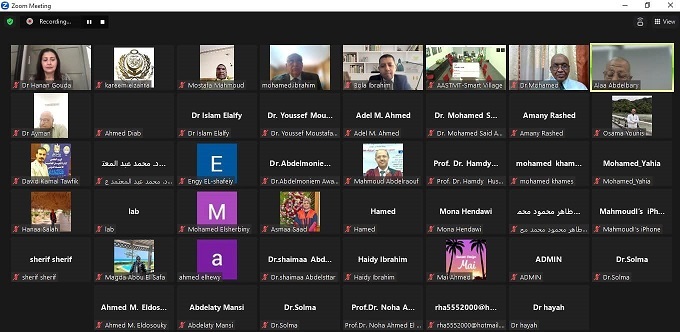
Learn more about this collaboration here.
AASTMT Hosts UniGreen Workshop to Promote Sustainable Tourism and Environmental Resilience in the Mediterranean
The UniGreen Workshop, hosted by AASTMT, provided a local education program addressing climate risks, CO2 emissions reduction, and climate adaptation in the Mediterranean region. The event focused on integrating sustainability and environmental resilience into academic curricula, with topics such as sustainable tourism and waste management practices. By equipping participants with knowledge of greenhouse gas mitigation and sustainable development strategies, the workshop highlights AASTMT’s commitment to promoting climate literacy and preparing students for climate-conscious careers.

Learn more about the UniGreen Workshop here.
AASTMT Launches MACI Journal to Advance Climate Education and Global Research Collaboration
The Multidisciplinary Adaptive Climate Insights (MACI) Journal, launched by AASTMT, supports local education and global research collaboration on climate change. This open-access platform focuses on climate risks, CO2 emissions reduction, adaptation strategies, and greenhouse gas mitigation. By disseminating research on climate resilience and sustainable development, MACI empowers students, researchers, and educators with critical knowledge to address climate challenges. This initiative highlights AASTMT’s commitment to advancing climate literacy and fostering a deeper understanding of global climate issues.

Learn more about the MACI Journal here.
AASTMT Students and Faculty Explore Sustainable Development and Climate Resilience at CEDARE
AASTMT students and faculty participated in a hands-on learning experience at the Centre for Environment & Development for the Arab Region & Europe (CEDARE), focusing on sustainable development and climate resilience. The visit included interactive sessions on climate change mitigation, greenhouse gas reduction, and CO2 emissions management. Participants explored strategies for water resource management and urban planning to enhance climate adaptation and impact reduction. This initiative reflects AASTMT’s commitment to providing local education programs on climate change and equipping students with practical skills for addressing global climate challenges.

Learn more about the CEDARE visit here.
Germany to Egypt Workshop on Meteorology and Environmental Studies:
The Germany to Egypt Workshop on Meteorology and Environmental Studies, hosted by AASTMT in collaboration with Freie Universität Berlin, provided a local education program addressing climate change risks, CO2 emissions reduction, and environmental monitoring. Participants engaged in theoretical and practical sessions on climate adaptation, greenhouse gas reduction, and early warning systems, focusing on meteorology and its role in mitigating climate impacts. This workshop highlights AASTMT’s commitment to advancing climate literacy, fostering international collaboration, and equipping students with the tools to address global climate challenges.

Learn more about the Germany to Egypt Workshop here.
International Workshop on Green Environment and Green Tourism:
The International Workshop on Green Environment and Green Tourism, co-hosted by AASTMT and the Italian Cultural Institute, provided a local education program addressing climate change risks, CO2 emissions reduction, and sustainable tourism practices. The workshop engaged participants from Egyptian and Italian universities in discussions on reducing greenhouse gas emissions and the environmental impacts of tourism. By promoting climate literacy and sustainable development strategies, the event underscores AASTMT’s commitment to climate adaptation and resilience through education.

Learn more about the International Workshop here.
Workshop on Meteorology and Environmental Studies at Freie Universität Berlin:
The Workshop on Meteorology and Environmental Studies, conducted at Freie Universität Berlin in collaboration with AASTMT, provided a local education program addressing climate change risks, CO2 emissions, and environmental adaptation. The workshop included theoretical lectures and hands-on training in meteorology, greenhouse gas monitoring, and early warning systems. Participants explored practical tools for studying climate impacts, such as weather data analysis and adaptation strategies, equipping them with the skills to mitigate and respond to global climate challenges. This initiative underscores AASTMT’s commitment to advancing climate literacy and fostering international collaboration in sustainability education.

Learn more about the workshop here.
AASTMT Hosts International Conference on Marine Environmental Protection and Sustainable Waste Management
AASTMT organized the International Conference on Marine Environmental Protection and Sustainable Waste Management to provide a local education platform addressing climate change risks, CO2 emissions, and greenhouse gas mitigation. The conference focused on marine conservation, waste management strategies, and sustainable development, equipping participants with knowledge of climate adaptation and impact reduction. By integrating climate literacy with actionable solutions, this initiative reflects AASTMT’s commitment to advancing climate resilience and fostering sustainable practices.

Learn more about the International Conference here.
Alexandria Workshop on Weather Routing and Carbon Emissions Reduction:
The Alexandria Workshop on Weather Routing and Carbon Emissions Reduction, hosted by AASTMT, provided a local education program addressing climate change risks, CO2 emissions reduction, and adaptation strategies. The workshop emphasized the role of weather routing in mitigating greenhouse gas emissions from maritime operations, featuring hands-on training with tools like the Bon Voyage System (BVS) and s-Planner for optimizing maritime routes. By promoting sustainable practices and raising awareness of the environmental impact of shipping, this initiative highlights AASTMT’s commitment to climate literacy and carbon reduction.
Learn more about the Alexandria Workshop here.
Carbon Stock Assessment of Mangrove Forests along the Red Sea Coast of Egypt: Towards Climate Change Mitigation
AASTMT conducted a carbon stock assessment of mangrove forests along the Red Sea coast, providing a local education program focused on climate change mitigation and greenhouse gas reduction. This initiative highlights the role of mangroves as natural carbon sinks, contributing to CO2 emissions reduction and climate adaptation. By engaging participants in the study of ecosystem-based solutions for climate resilience, this program reflects AASTMT’s commitment to equipping students and researchers with the knowledge and tools to address climate risks and promote sustainable environmental practices.

Learn more about the Carbon Stock Assessment project here.
Application of Renewable Energy Technologies for Green Ports: A Case Study on Egyptian Ports
AASTMT’s case study on the application of renewable energy technologies for green ports provides a local education program addressing climate change risks, CO2 emissions reduction, and adaptation strategies in maritime operations. The study explores the integration of solar panels, offshore wind turbines, and fuel cells to minimize the carbon footprint of Egyptian ports. By promoting sustainable practices and mitigating greenhouse gas emissions, this initiative reflects AASTMT’s commitment to advancing climate literacy and equipping participants with innovative solutions for climate resilience and impact reduction.

Learn more about the Green Ports initiative here.
Innovative Photovoltaic Envelopes for Adaptive Energy and Comfort Management in Harsh Climates: Toward Nearly Zero Energy Buildings in Upper Egypt
AASTMT’s project on innovative photovoltaic envelopes provides a local education program addressing climate change risks, CO2 emissions reduction, and climate adaptation. Focused on developing nearly zero-energy buildings in Upper Egypt, the initiative integrates solar energy technologies to improve energy efficiency and mitigate greenhouse gas emissions. Participants explore solutions for adaptive thermal management and sustainable building design, equipping them with practical knowledge for climate resilience and impact reduction in extreme climates. This initiative highlights AASTMT’s commitment to advancing climate literacy and fostering sustainable practices.

2021-2022
At the Arab Academy for Science, Technology & Maritime Transport (AASTMT), our commitment to Sustainable Development Goal 13 (SDG 13) - Climate Action is deeply ingrained in our educational ethos. Recognizing the vital importance of climate education in shaping a sustainable future, we have implemented a diverse array of local education programs and campaigns focusing on climate change. These initiatives, ranging from specialized academic courses to international conferences and community events, are designed to foster a comprehensive understanding of climate change risks, impacts, mitigation strategies, adaptation techniques, impact reduction, and early warning systems.
The following sections highlight key endeavors undertaken by AASTMT in the academic year 2021/2022, showcasing our proactive approach in integrating climate education across various platforms and disciplines. Each initiative contributes uniquely to enhancing climate awareness and preparedness among our students, faculty, and the wider community. We invite you to explore the details and impacts of these programs, which are further elucidated with links to additional resources and documentation available on our website.
Our efforts in environmental education are a testament to AASTMT’s dedication to not only educating future leaders in environmental stewardship but also actively participating in global dialogues and actions against climate change. These initiatives represent our ongoing commitment to contribute significantly to the global agenda of combating climate change and preserving our planet for future generations.
The Arab Academy for Science, Technology & and Maritime Transport (AASTMT) has been at the forefront of addressing climate change through a variety of educational programs and campaigns. The following initiatives demonstrate our commitment to educating our community about climate change risks, impacts, mitigation, adaptation, impact reduction, and early warning:
Master of Science Degree in Smart Environmental and Climate Change Management (SECCM)
At the Maritime Postgraduate Studies Institute: This program offers advanced education on environmental and climate change, equipping students with skills to manage climate-related challenges.
More details are available Master Of Science Degree In Smart Environmental And Climate Change Management SECCM on the AASTMT web page
Maritime Meteorology Course for Undergraduate Students
At College of Maritime Transport and Technology: This course provides undergraduates with essential knowledge on meteorological phenomena related to maritime activities and their interrelation with climate change.
Explore the course Maritime-Meteorology-Course on the AASTMT web page
International Conference for Future Studies and Risk Management (ICFSRM2022)
Themed “Climate Change, Challenges and Threats,” this conference addressed various aspects of climate change, including agricultural risks and energy supply chains.
Learn more about the conference's objectives and outcomes ICFSRM2022-Conference on the AASTMT news page
Participation in COP27 2022
AASTMT's participation in COP27 involved a high-ranking delegation and focused on scientific exchange and collaboration, especially in the context of Egyptian-German diplomatic relations. Our delegation from the College of Engineering and Technology participated in this session, presenting impactful student projects related to climate change. Details of the participation can be found
COP27-2022-Participation on the AASTMT news page
Prof.Dr.Ibrahem hassan and a tv show about cop27 on the AASTMT news page
College of engineering and technology, Arab Academy for science and technology participation in cop27 on the AASTMT news page
World Environment Day 2022
Celebrated under the theme “Only One Earth,” this event at the Abu Kir campus showcased AASTMT's commitment to sustainable development and environmental protection.
Event details can be found World-Environment-Day-2022 on the AASTMT web page
Participation in the 52nd Session on Arab Economic Issues and Climate Change
AASTMT's involvement in discussions on economic and climate-related issues underlines our commitment to regional environmental concerns.
More on this session is available 52nd-Session-Arab-Economic-Issues on the AASTMT news page
Entrepreneurship Center Seminar on Environment Sector Entrepreneurship
A seminar featuring the Minister of Environment focused on waste management and nature reserves, highlighting youth initiatives that serve environmental goals.
Seminar details are accessible Entrepreneurship-Center-Seminar-Link
Workshop Program on Electrical Energy Efficiency toward the Achievement of SDGs in Marine Application
This workshop evaluated the role of energy-environmental efficiency in achieving SDGs, particularly in the marine sector.
Workshop on the AASTMT web page
Each of these programs and initiatives underscores AASTMT's comprehensive approach to environmental education, emphasizing our dedication to raising awareness and finding solutions to the challenges posed by climate change.



